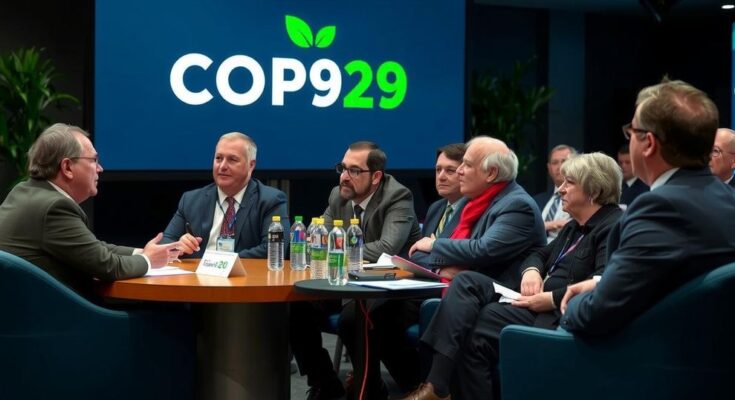The upcoming COP29 presents a crucial opportunity for African nations to finalize the New Quantified Goal on Climate Finance amid severe climate challenges. The continent’s vulnerability to extreme weather necessitates urgent action and international support, emphasizing the need for both adaptation and mitigation strategies. With proper planning and innovative finance, Africa can harness its natural resources for sustainable growth and climate leadership.
In addressing the pressing climate issues faced by African nations, it is imperative to acknowledge the crucial role of COP29. The upcoming conference presents a pivotal opportunity for the African Group of Negotiators to finalize the New Quantified Goal on Climate Finance, pushing for necessary backing from the African Ministerial Conference on the Environment (AMCEN). Current observations reveal that the climate crises of change, biodiversity loss, and pollution disproportionately impact the continent, exemplified by Southern Africa’s severe drought, which highlights the urgent need for coordinated action across international frameworks. The World Meteorological Organization predicts that by 2030, approximately 118 million extremely poor individuals will face weather-related adversities in Africa. Simultaneously, nations may incur GDP losses of up to five percent due to climate change. Heightened debt levels could hinder national responses to extreme weather, emphasizing the need for substantial international support. Notably, the adaptation finance gap sits at an alarming US$187-359 billion per year. Furthermore, African nations are urged to innovate financial solutions such as private sector investments and debt-for-nature swaps while promoting community involvement and indigenous practices in climate resilience strategies. While adaptation remains critical, it is equally vital to emphasize mitigation efforts. Despite Africa’s minimal contribution to global emissions, the continent must play a proactive role in addressing climate change. In anticipation of the forthcoming Nationally Determined Contributions (NDCs) submissions, larger emitting nations must spearhead substantive reductions in greenhouse gas emissions. Africa’s rapid development must not fall into high-carbon traps; instead, leaders should pursue NDCs that prioritize sustainable, low-carbon growth, creating green jobs and ensuring universal access to renewable energy. The continent’s vast natural resources and youthful demographics present unique opportunities for fostering solutions to food security and climate resilience. African nations can take advantage of the growing demand for critical energy transition minerals, ensuring long-term investment and sustainable development while protecting natural ecosystems. It is crucial to establish policies that facilitate responsible mining and circularity, safeguarding both the environment and community well-being. In summary, climate change presents significant challenges to Africa, yet it also offers avenues for the continent to emerge as a global leader in innovative climate solutions.
The speech addresses the critical issues facing African nations in relation to climate change, particularly in light of the upcoming COP29. It contextualizes the impacts of climate change, land degradation, and biodiversity loss on the continent and highlights the urgent need for collaborative action and financial support from the international community. The need for innovative financial mechanisms and the role of African nations in shaping their climate futures through sustainable development are key themes.
In conclusion, while African nations confront formidable climate challenges, the forthcoming COP29 provides a vital platform for advancing climate finance and promoting sustainable development models. By focusing on innovative solutions and responsible resource management, Africa can not only address the immediate impacts of climate change but also position itself as a leader in the global climate arena. Collective action, international support, and commitment to low-carbon growth pathways will be essential in achieving these goals.
Original Source: www.unep.org




